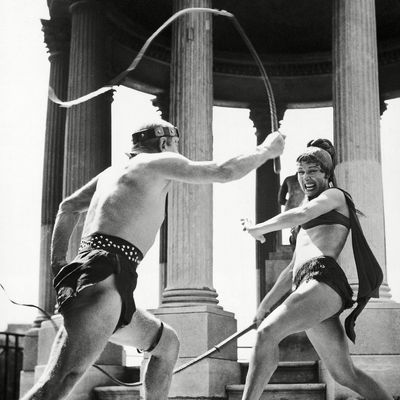
For years, Hillary Schieve, the mayor of Reno, had heard residents complain about people cracking whips around town. But she understood what a big problem this was last year, when she was speaking to a constituent while walking into City Hall. “I heard this snap. It sounds just like a gun,” she told me over the phone. “It’s incredibly frightening because you’re looking around and you’re like, ‘Oh my gosh. Does someone have a gun?’” It was just a man cracking his whip on the concrete, but Schieve and the other people in the plaza were nevertheless shaken up. “The woman I was talking to had a dog. And when the dog heard it, he ran in front of a car,” she said. (Luckily, the animal was unharmed.)
Calls to the police complaining about public whip use, or mistaking its sound for gunfire, began coming in with more frequency around summer 2018. Those calls have doubled over the last year, Lieutenant Ryan Connelly of the Reno Police Department told me. And since they are often reported as shots fired, such interactions were tying up considerable police resources, he said.
But the whip problem extends beyond noise infractions. Connelly described a fight near City Hall, in which a man was whipped in the face, then beaten with a gun. “It’s not just a nuisance crime when people are getting hurt,” he said.
Two weeks after the incident Connelly described, Brian Sooudi, the Reno city attorney who wrote the ordinance that would end up banning whips in the city, said a man with a whip standing by the giant “BELIEVE” sculpture downtown was approached by another man, who asked if he could try it out. The two ended up arguing, which resulted in the whip man being stabbed. (His injuries were non-life-threatening.)
The City Council first discussed the idea of banning whips on August 25. As usual, the council’s meeting that day began with residents taking the floor to voice their concerns — an endless cast of characters opining on city problems and possible new laws. Eric Lerude, a downtown resident sporting a short-sleeved button-up, expressed his support for the whip ordinance. “I frequently hear the whips cracking,” he said. “I hear them from my home. I hear them when I’m out and about. They make a very scary noise.”
Another resident, Anthony Townsend, complained that he often hears the sound of whips in the middle of the night, and told a story about going to the Truckee River with “[his] lady” and seeing a man crack the biggest whip he’d ever seen, which sounded like a “9mm goin’ off.”
Not everyone was gung-ho on the possible ban. Local resident Gabe Stransky, sporting a black fedora over his long dark-brown locks, objected, explaining that he found it “discriminatory.” “I think it’s pretty ridiculous that you’re gonna single out about a dozen houseless people in this city,” he said. “If there’s an issue of them attacking people with the whips, that’s an assault thing, and there are already laws in place for that.”
Next, Stransky’s friend Bill Sims, wearing a Superman T-shirt, stepped up to the mic, and asked his elected officials, “Why do you guys have such a consistent erection for punishing homeless people?” After playing some frankly horrific audio of a whip-cracking on his phone — the sound high-pitched and staticky — he asked the council, “You find that annoying? … If you really find it that annoying, all I can say is, ‘Grow the F up.’” He suggested that whip-cracking helps Reno’s most vulnerable population “relieve anxiety, stress, [and] depression” and finished up his diatribe by imploring the council members to not be “a bunch of Karens.” (Both the mayor and Ryan Connelly said that they aren’t sure that it’s primarily homeless people using whips.)
Despite the objections of Sims, Stransky, the Nevada ACLU, and a self-identified “horse rider” who said at another council meeting that she uses crops to keep her horses out of “dangerous situations,” the City Council ultimately passed the ordinance 6-1 on October 13. Reno PD will begin to enforce it on November 20. The new law will make using a whip downtown illegal without a permit. But citywide, whip use is only prohibited if the whip is used to “injure, annoy, interfere with, or endanger the comfort, repose, health, peace or safety.”
Jenny Brekhaus, the sole City Council member who voted against the ban, told me that she believes Reno does have a whip problem that needs to be addressed. She ultimately didn’t support the ordinance because she was worried that a possession law could result in “a stop-and-frisk situation.” She also objected to the way the map delineated no-whipping zones. (Sooudi said the map was drawn to ensure that Reno’s ranchers and other people using whips for more legit purposes wouldn’t have to worry about breaking the law.)
Sooudi said the ordinance was needed because there wasn’t much the police department could do to address whip complaints. “A whip is a weapon defined in either state law, county law, or city law virtually across the entire country,” he told me. “Nevada state law doesn’t have whips listed as a weapon.” His research found that the further west you go, the less likely it is that states classify whips as weapon, since crops were used to move horses and herd cattle in this part of the country.
Reno was not the first city to specifically ban whips: Sooudi modeled the ordinance on a similar law enacted in Kaua’i County, Hawaii, in 2018. And public whip use isn’t necessarily a new problem. Mark Allen, the former proprietor of Western Stage Props in Las Vegas, who lent his whip expertise to help create the Reno ordinance, told me that when he was a child, growing up in Queens in the 1950s and ’60s, he would often practice cracking his whip in the streets. Someone would inevitably call the police, mistaking the sound for gunfire, as people do now in Reno. Allen now teaches a popular Thursday night whip class in Las Vegas, where he lives. He said he hasn’t observed a public whip problem in that city.
Why whip hobbyism has become such a big deal in Reno at this moment remains an enigma. Allen guessed that the pandemic exacerbated the city’s whip problem, since it led to a growing number of people out of work and/or bored, stuck inside their homes, and looking for a new hobby. Sooudi observed, “I can tell you that ever since COVID hit, things have been so bizarre.”
In a local news segment, Linda Louella Winder, identified as “whip user,” said, “I believe they’re a method of self-defense. Making that whip is an art project. It gives us something to do. We buy or find the leather, the cord, uh, the string. We make those whips out of things that you leave. We recycle!” (Winder did not respond to my requests for comment.) In a video posted on the Reno subreddit, a man holding a whip in a public park explained that his sister got him hooked. “The science behind it is actually quite interesting,” he said. “It breaks the sound barrier, it goes faster than a supersonic jet. That is remarkable.” Maybe Reno’s whip problem came to be simply because more and more of its residents discovered that whips are kinda cool. And maybe your city is next.





























